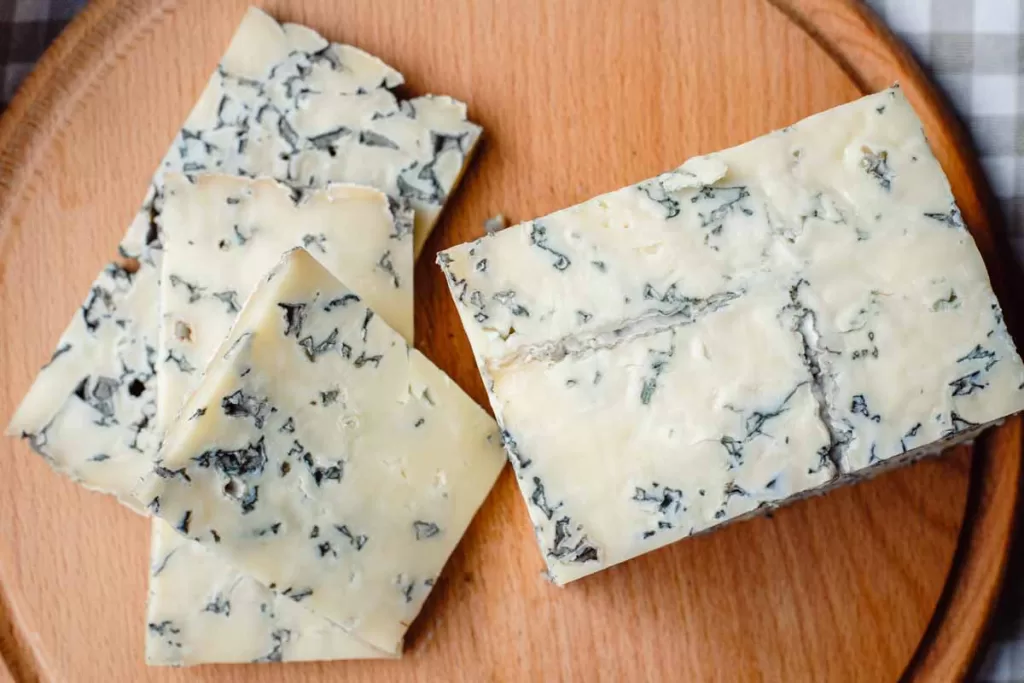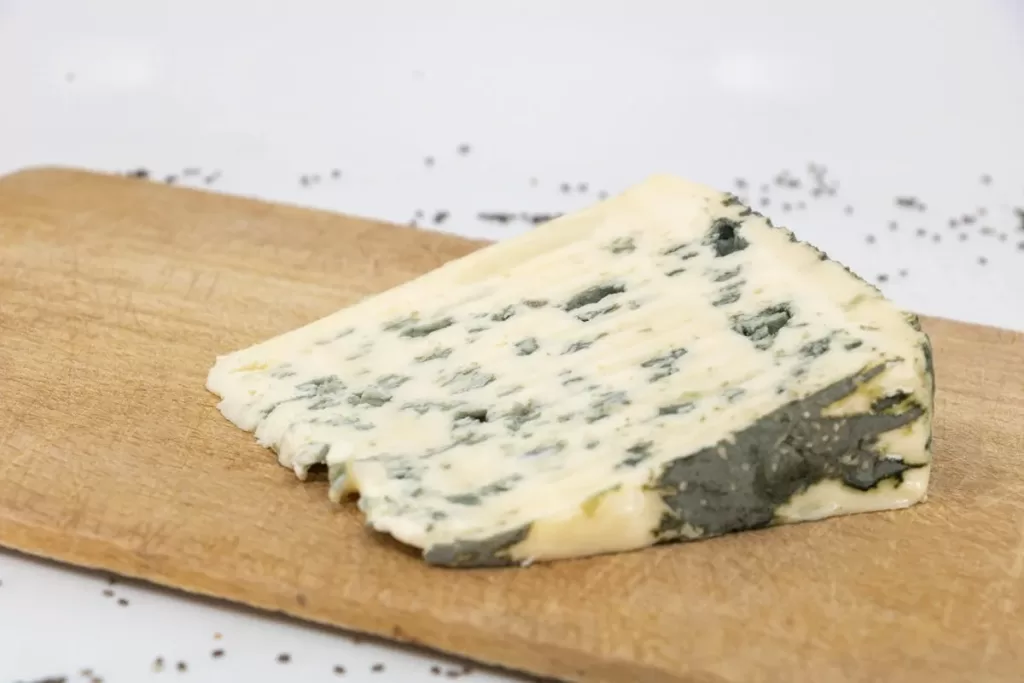Can Dogs Eat Blue Cheese? Blue cheese is a type of cheese that is made from cow’s milk. It has a blue color and a strong, sour flavor. Some people think that dogs can’t eat blue cheese because of its strong flavor, but that isn’t always the case.
In fact, some dog owners believe that blue cheese can be a great addition to their pet’s diet.
Table of Contents
Can dogs eat blue cheese? There is some debate about this, but most experts advise against it. Blue cheese is high in cholesterol and can be harmful to a dog’s health.
Some people say that this cheese can even be poisonous to a dog if ingested in high doses.
It’s best to keep your furry friend away from blue cheeses like Stilton and be safe. The fungus that makes these cheeses produces Stilton, a substance that can be harmful to dogs.
Symptoms of Stilton poisoning in dogs include vomiting, diarrhea, high temperatures, and even seizures.
If you think your dog has eaten blue cheese, it’s important to call your vet right away. Stilton poisoning is serious, but with prompt treatment, most dogs make a full recovery.
Here are some tips to help keep your dog safe from blue cheese poisoning:
- Do not give your dog blue cheese. It seems obvious, but it bears repeating. Blue cheese is not safe for dogs, so don’t even give it to them as a treat.
- Be careful what you feed around your dog. If you eat blue cheese, be sure to keep it away from your dog. Even if your dog doesn’t eat large amounts of blue cheese, it’s still enough to make him sick.
- Check the ingredients of dog treats and food. Some dog foods and treats contain blue cheese or other ingredients that can be harmful to dogs. Read labels carefully before giving treats or food to your dog.
By following these tips, you can help keep your dog safe from blue cheese poisoning.
What is Blue Cheese?

What is blue cheese? It is a type of cheese that originated in the United States. It’s made from cow’s milk and has a blue or green tint due to the bacteria lactic acid bacteria. This is usually served cold with fruits, nuts, and crackers.
Penicillium roqueforti is a sort of mold that is typically responsible for the blue color, and it is a fungus that is utilized in the production of cheese. Penicillium glaucum is an additional species of mold that is frequently utilized in the production of several types of blue cheese.
Also Read: When to take the cone off the dog after neuter? 14 Days!
During the process of making the cheese, mold veins are introduced into the result. During this stage of the procedure, the cheese is perforated with thin rods made of stainless steel. This permits air to enter the cheese, which in turn permits the growth of mold.
After processing, the cheese is matured in an environment where the temperature is carefully controlled. As the mold multiplies, it brings about alterations in the cheese’s flavor, fragrance, and other characteristics.
There is more than one variety of blue cheese, and some of the more well-known ones are Roquefort, Gorgonzola, and Stilton. Although it is high in salt content, blue cheese has a reputation for being a highly nutritious type of cheese.
Calcium, protein, and phosphorus are all found in quite high concentrations in it.
Can Dogs Eat Blue Cheese | Is Blue Cheese Safe for Dogs?
Here is a chart on the pros and cons of blue cheese for dogs:
| Pros | Cons |
|---|---|
| Some dogs may enjoy the taste of blue cheese. | Blue cheese contains a substance called roquefortine C, which can be harmful to dogs. |
| Blue cheese is a good source of calcium and protein. | Blue cheese can also contain harmful bacteria, such as Listeria monocytogenes. |
| Blue cheese is a low-fat food. | Blue cheese can be high in sodium. |
There is some debate surrounding this question but in general, most experts say that if your dog consumes small amounts of blue cheese- typically the equivalent of a few tablespoons- they are likely safe.
However, if your dog ingests large amounts of blue cheese, or any type of cheese for that matter it’s strongly suggested that you speak with a veterinarian as there could be potential health risks associated with overconsumption.
There is also the possibility that your dog has lactose intolerance or an allergy to dairy products. In this particular scenario, it is not safe for your dog to consume even a small amount of blue cheese. It’s not a good idea to give your dog cheese or any other dairy products; it could make him sick.
Also Read: Mouth Cancer in Dogs
There is also another problem that, depending on its severity, can be rather important. There is a chemical known as roquefortine C that can be produced when certain blue cheeses deteriorate.
This is something that is commonly present in blue cheeses like Stilton and Roquefort, and it is extremely harmful to dogs.
Roquefortine C is typically found in cheese that has reached its expiration date. It is possible that the dog will discover it in the trash and eat it, which will result in the dog becoming very ill.
What Happens When Dogs Eat Blue Cheese
This cheese, like other high-fat cheeses such as cottage cheese, cream cheese, and goat cheese, is full of fat. It is possible for a dog to get pancreatitis if its diet consists of a significant number of items intended for humans, particularly mozzarella or feta cheese.
Due to the enzyme and cow’s milk, digestive issues are typical in dogs that have consumed excessive amounts of cheese. These issues include diarrhea and kidney difficulties.
Dog owners should try to stick to treats that come in modest quantities as much as possible in order to reduce the likelihood that their dogs will become overweight.
As Brie and cheddar cheese are also known to have an effect on a dog’s stomach as well as their overall health, it is important to limit your dog’s consumption of goodies that are high in fat in order to protect your furry buddy.
Macadamia nuts and parmesan are examples of high-salt snacks that should only be given to your dog on a very rare occasions as a treat; they should not be regarded as a regular part of his diet.
Symptoms of Roquefortine C Poisoning in Dogs
In the event that your dog consumes spoiled blue cheese, you may observe the following symptoms of Roquefortine C poisoning in him:
- Vomiting
- Diarrhea
- Restlessness
- Disorientation
- Tremors
- Seizures
- High temperature
- Abdominal discomfort
If you know for sure or think that your dog has consumed spoiled blue cheese, you should contact the veterinarian as soon as possible. This is a serious medical emergency that could end in death. Your dog requires immediate medical attention due to their condition.
If immediate medical attention is given to your dog, there is a very good possibility that he will make a complete recovery.
Conclusion
In conclusion, while some dogs may enjoy eating it, others may not due to the strong flavor. For those dogs that do enjoy the flavor, it can be enjoyed in moderation as part of a balanced diet.
However, for those dogs that are not fans of the strong flavor, there is no need to worry as blue cheese is not a common ingredient in most dog foods. Instead, opt for opting for other types of cheese that your dog may enjoy more.

